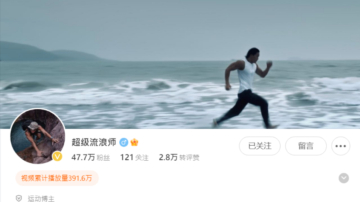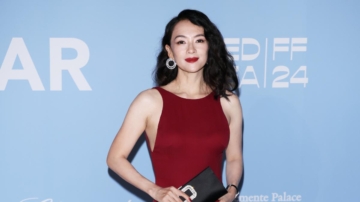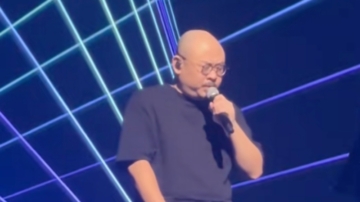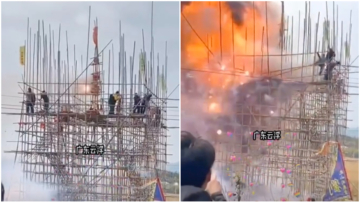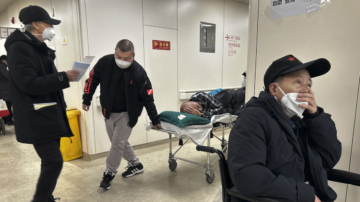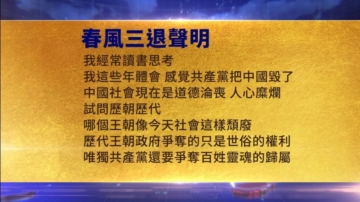【新唐人2015年02月17日讯】一直以来,中国高校领导的人事变动都是令外界瞩目,而最近最热门的话题应该是北京大学,原校长王恩哥接任北大不到2年就被撤换,由颇具争议的浙大校长林建华接任,引发外界讨论,这也是7年来北大校长第3次换人。对于中国大学校长更换为何如此频繁?标准又是在哪?我们一起来看看下面的报导。
2月15号,浙江大学前校长林建华出任北京大学新任校长,成为北大第27任校长。
根据北京大学的新闻稿,该项人事任命是在当天上午召开的全校教师干部大会上,由中共中央组织部副部长潘立刚宣布的,原北京大学校长王恩哥将另有任用。
王恩哥于2013年3月接任北大校长,至今不到2年,成为近年来北大任职时间最短的一名校长。王恩哥的前任周其凤也仅担任4年多校长,这次人事调动,是近7年来北大校长的第三度换人,频繁程度可谓罕见。
根据英国广播公司《BBC》报导,近期北大校办企业方正集团原董事长魏新、首席执行官兼董事李友、总裁兼董事馀丽等五名高管,由于被查而备受争议,身为北大校长的王恩哥也难免受到影响。
江苏东南大学法学院教授张赞宁:“我们中国校长的任命、更换,从来就跟高层意识形态或权力斗争是有很大关系的。”
旅美原大陆历史学教授刘因全:“北京大学这次可能是因为北大方正出了事,北大方正几个主管被抓了以后,被审查以后,有可能牵扯到原来的校长,在这种情况下,他就要换一个校长,中共一贯重视思想政治,所以中共那边当然要以政治方面作为考量。”
被外界认为亲习近平、胡锦涛阵营的消息人士牛泪发文透露,撤换王恩哥有三大原因。第一,中共高层政治的结构性变化,特别是“之江系”干部崛起;第二,高校意识形态工作的当前政策变化;第三,北大方正和北大青鸟等先后深度涉入高层官场腐败要案,也可能使中共中央认为王恩哥应负管理责任。
林建华曾任北京大学副校长、常务副校长,2010年12月至2013年6月任重庆大学校长。2013年6月任浙江大学校长,2015年2月任北京大学校长。换句话说,林建华短短5年就换了三个地方。
关于浙大校长林建华调任北京大学,网路上也是讨论得沸沸扬扬,浙江大学校友在微博留言表示,这说明了大学只是政府的一个部门而已。另一名网友说,中国大学现在只是官场。
据了解,2015年才刚开始,中国已有6所知名高校换了校长。包括北京大学、浙江大学、清华大学、中国科学技术大学、中山大学、南方科技大学。
资料显示,美国哈佛大学371年的历史性发展中,历任的28位校长,平均任期超过10年。北京大学在近33年来,经历7任校长,平均每位任期不到5年。
中国教育科学研究院研究员储朝晖在媒体表示,这种变动对于高校的影响是显而易见的。储朝晖认为,一任校长在学校的任期应该在10年左右,这才能保证其拥有充分的时间实现自身的治校理想。但在行政化系统下,校长任期受行政化影响过大。
采访编辑/黄亿美 后制/葛雷
Frequent Changes to China's University Leaders
Hard to Separate Politics and Universities
Personnel changes to Chinese university leaders
have always caught the attention of the outside world.
The most popular recent topic should be former president
of Beijing University, Wang Enge, who was removed
from the position in less than two years.
The controversial president of Zhejiang University
Lin Jianhua took over this position.
This is the third change to the presidency of Beijing University
in the last seven years.
Why are there so many changes to university heads in China?
What are the standards and rules?
On Feb. 15 former Zhejiang University president, Lin Jianhua
took the position as president of Beijing University.
He became its 27th president.
According to a Beijing University news article,
the appointment was announced by Pan Ligang,deputy party
leader of the CCP Central Organization Committee.
Former president of Beijing University, Wang Enge,
will be assigned to another position.
Wang Enge became the President of Beijing University
less than two years ago in Mar. 2013.
His tenure as president was the shortest.
Wang's predecessor, Zhou Qifeng, served about four years.
This personnel change was the third in the last seven years.
The frequency of change is rare.
According to the BBC, there have been controversies about
Beijing University owned business, the Founder Group,
due to investigation of its five executives including
former chairman Wei Xin, CEO and board member, Li You,
president and board member, Yu Li, and others.
Wang Enge as president was inevitably affected.
Jiangsu Southeast University Law School professor,
Zhang Zanning: "The appointment of university leaders
is always closely related to the ideology of senior officials
or power struggles."
Former history professor from China, Liu Yinquang:
"This may be related to the trouble with the Founder Group.
The arrest and investigation of several executives
may involve the former president.
So it needs a change of president.
The CCP always attaches importance to ideology and politics.
So the CCP will take political factors into consideration."
Niu Lei, insider pro-Xi Jinping and Hu Jintao,
revealed that there were three main reasons to replace Wang Enge.
First, the political structure changes in the CCP leadership,
especially the rise of the Jiang faction;
second, the current university policy change on ideological work;
third, the Founder Group and Jade Bird's deep involvement
in high-level corruption cases may also make the CCP
Central Committee blame Wang Enge as responsible.
Lin Jianhua was once vice president and
executive vice president of Beijing University.
From Dec. 2010 to Jun. 2013 he was the president
of Chongqing University.
In Feb. 2015 he became the president of Beijing University.
Lin Jianhua changed his position three times in five years.
There are also heated discussions over the internet
about Lin Jianhua's transition to Beijing University.
Zhejiang University netizen wrote in his microblog that
university is merely a department of the government in China.
It is understood with 2015 just begun,
six well-known universities changed presidents,
including Beijing, Zhejiang,and Qinghua Universities,
also the University of Science and Technology of China,
Zhongshan University and South University of Technology.
Data show that in the 371 year history of Harvard University,
there have been 28 presidents, with average tenure of over ten years.
In the past 33 years, Beijing University has had seven presidents,
with an average term of less than five years.
Chinese Academy of Educational Sciences researcher,
Chu Zhaohui, stated to the media that
the impact of these changes on universities is obvious.
Chu Zhaohui believes that a president's term should be
about 10 years to ensure sufficient time
to achieve their school governance ideas.
However, under the political administration,
the term of office is strongly impacted by politics.
Interview & Edit/Huang Yimei Post-Production/GeLei
2月15号,浙江大学前校长林建华出任北京大学新任校长,成为北大第27任校长。
根据北京大学的新闻稿,该项人事任命是在当天上午召开的全校教师干部大会上,由中共中央组织部副部长潘立刚宣布的,原北京大学校长王恩哥将另有任用。
王恩哥于2013年3月接任北大校长,至今不到2年,成为近年来北大任职时间最短的一名校长。王恩哥的前任周其凤也仅担任4年多校长,这次人事调动,是近7年来北大校长的第三度换人,频繁程度可谓罕见。
根据英国广播公司《BBC》报导,近期北大校办企业方正集团原董事长魏新、首席执行官兼董事李友、总裁兼董事馀丽等五名高管,由于被查而备受争议,身为北大校长的王恩哥也难免受到影响。
江苏东南大学法学院教授张赞宁:“我们中国校长的任命、更换,从来就跟高层意识形态或权力斗争是有很大关系的。”
旅美原大陆历史学教授刘因全:“北京大学这次可能是因为北大方正出了事,北大方正几个主管被抓了以后,被审查以后,有可能牵扯到原来的校长,在这种情况下,他就要换一个校长,中共一贯重视思想政治,所以中共那边当然要以政治方面作为考量。”
被外界认为亲习近平、胡锦涛阵营的消息人士牛泪发文透露,撤换王恩哥有三大原因。第一,中共高层政治的结构性变化,特别是“之江系”干部崛起;第二,高校意识形态工作的当前政策变化;第三,北大方正和北大青鸟等先后深度涉入高层官场腐败要案,也可能使中共中央认为王恩哥应负管理责任。
林建华曾任北京大学副校长、常务副校长,2010年12月至2013年6月任重庆大学校长。2013年6月任浙江大学校长,2015年2月任北京大学校长。换句话说,林建华短短5年就换了三个地方。
关于浙大校长林建华调任北京大学,网路上也是讨论得沸沸扬扬,浙江大学校友在微博留言表示,这说明了大学只是政府的一个部门而已。另一名网友说,中国大学现在只是官场。
据了解,2015年才刚开始,中国已有6所知名高校换了校长。包括北京大学、浙江大学、清华大学、中国科学技术大学、中山大学、南方科技大学。
资料显示,美国哈佛大学371年的历史性发展中,历任的28位校长,平均任期超过10年。北京大学在近33年来,经历7任校长,平均每位任期不到5年。
中国教育科学研究院研究员储朝晖在媒体表示,这种变动对于高校的影响是显而易见的。储朝晖认为,一任校长在学校的任期应该在10年左右,这才能保证其拥有充分的时间实现自身的治校理想。但在行政化系统下,校长任期受行政化影响过大。
采访编辑/黄亿美 后制/葛雷
Frequent Changes to China's University Leaders
Hard to Separate Politics and Universities
Personnel changes to Chinese university leaders
have always caught the attention of the outside world.
The most popular recent topic should be former president
of Beijing University, Wang Enge, who was removed
from the position in less than two years.
The controversial president of Zhejiang University
Lin Jianhua took over this position.
This is the third change to the presidency of Beijing University
in the last seven years.
Why are there so many changes to university heads in China?
What are the standards and rules?
On Feb. 15 former Zhejiang University president, Lin Jianhua
took the position as president of Beijing University.
He became its 27th president.
According to a Beijing University news article,
the appointment was announced by Pan Ligang,deputy party
leader of the CCP Central Organization Committee.
Former president of Beijing University, Wang Enge,
will be assigned to another position.
Wang Enge became the President of Beijing University
less than two years ago in Mar. 2013.
His tenure as president was the shortest.
Wang's predecessor, Zhou Qifeng, served about four years.
This personnel change was the third in the last seven years.
The frequency of change is rare.
According to the BBC, there have been controversies about
Beijing University owned business, the Founder Group,
due to investigation of its five executives including
former chairman Wei Xin, CEO and board member, Li You,
president and board member, Yu Li, and others.
Wang Enge as president was inevitably affected.
Jiangsu Southeast University Law School professor,
Zhang Zanning: "The appointment of university leaders
is always closely related to the ideology of senior officials
or power struggles."
Former history professor from China, Liu Yinquang:
"This may be related to the trouble with the Founder Group.
The arrest and investigation of several executives
may involve the former president.
So it needs a change of president.
The CCP always attaches importance to ideology and politics.
So the CCP will take political factors into consideration."
Niu Lei, insider pro-Xi Jinping and Hu Jintao,
revealed that there were three main reasons to replace Wang Enge.
First, the political structure changes in the CCP leadership,
especially the rise of the Jiang faction;
second, the current university policy change on ideological work;
third, the Founder Group and Jade Bird's deep involvement
in high-level corruption cases may also make the CCP
Central Committee blame Wang Enge as responsible.
Lin Jianhua was once vice president and
executive vice president of Beijing University.
From Dec. 2010 to Jun. 2013 he was the president
of Chongqing University.
In Feb. 2015 he became the president of Beijing University.
Lin Jianhua changed his position three times in five years.
There are also heated discussions over the internet
about Lin Jianhua's transition to Beijing University.
Zhejiang University netizen wrote in his microblog that
university is merely a department of the government in China.
It is understood with 2015 just begun,
six well-known universities changed presidents,
including Beijing, Zhejiang,and Qinghua Universities,
also the University of Science and Technology of China,
Zhongshan University and South University of Technology.
Data show that in the 371 year history of Harvard University,
there have been 28 presidents, with average tenure of over ten years.
In the past 33 years, Beijing University has had seven presidents,
with an average term of less than five years.
Chinese Academy of Educational Sciences researcher,
Chu Zhaohui, stated to the media that
the impact of these changes on universities is obvious.
Chu Zhaohui believes that a president's term should be
about 10 years to ensure sufficient time
to achieve their school governance ideas.
However, under the political administration,
the term of office is strongly impacted by politics.
Interview & Edit/Huang Yimei Post-Production/GeLei

